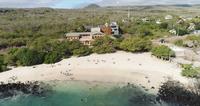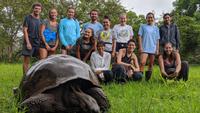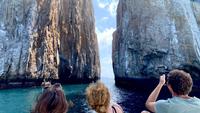IES-Galapagos Islands
Program Details
| Program Location |
Quito and San Cristobal Island, Ecuador
|
| Sponsor |
IES |
| Program Type |
Co-sponsored |
| Course # |
SA 33026
|
| Duration |
Semester
|
| Upcoming Program Dates |
| Spring 2025 |
01/09/25 to 05/10/25
|
| Fall 2024 |
08/08/24 to 12/06/24
|
| Past Dates |
| Spring 2024 |
01/05/24 to 05/04/24 |
Please Note: Programs may be altered or adapted with little notice
Overview

IES organizes this program through the Galápagos Academic Institute for the Arts and Sciences (GAIAS), a remote campus of the Universidad San Francisco de Quito (USFQ) located on the island of San Cristóbal.
Fast paced and as rewarding as it is challenging, this program is great for students interested in conducting field research or going on to graduate school. Think of the ideal candidate as a streetwise Indiana Jones—that is, one who would happily trade indoor luxury for adventurous experiences, plenty of sun, and the open ocean air.
Imagine yourself exploring the Galápagos islands as part of your classes. Swimming with sea lions, snorkeling, and getting to know the local culture are just a few of the amazing students get to have each semester.
Located on the island of San Cristobal, the USFQ Galápagos campus offers international students the opportunity to study in one of the most pristine natural laboratories in the world.
This program begins in Quito, Ecuador, and the travels to the Galápagos for the remainder of the program.
For more program information, please visit the
program website.
This program is sponsored by:
IES.
Eligibility
- Sophomore, junior, or senior standing when program begins
- At least one general biology or one ecology course at the college level.
- Marine track students must have taken a prior biology class and will require DAN insurance for academic dives (dives included in program price, DAN and PADI certification is not)
GPA Requirement:
3.0 on a 4.0 scale
Language Requirement: none
Purdue Credit
Direct Credit
available from the following:
[
College of Engineering] [
College of Liberal Arts] [
College of Science]
Specifically from:
BIOL (SCI)
Students interested in completing courses while abroad from Purdue colleges or departments that are not listed above should discuss this with their study abroad advisor before applying to the program.
Academic Program
You will take 16-19 credits per semester, and all courses are worth 3 credits. You are required to take a 1-credit Spanish language course at the beginning of the semester.
Courses are taught USFQ faculty in a series of five consecutive modules. The first module is taught at the USFQ Cumbayá campus near Quito. Remaining modules are taught at the GAIAS campus on the island of San Cristóbal.
The program offers the following tracks, each consisting of five courses, or modules. You must take all courses in your selected track.
- Evolution, Ecology & Conservation
- Marine Ecology*
All area studies courses are taught in English. Further information about course content and availability is provided on the University’s website. Courses vary by semester.
*This track carries an extra fee.
Engineering majors -please note while this program has approval for engineering, many of the courses offered on the Galapagos program are not engineering-related. While you may be able to find an elective or two, if you are searching for engineering classes in Ecuador, consider USFQ's main campus in Quito. Click here for more information.
Excursions
Even though your adventure starts in the Galápagos Islands, field trips take you beyond the city to discover the culture and traditions of your host country.
Depending on your program track, you will visit the Ecuadorian highlands, the coast, or the cloud forest during the first module. All students also visit USFQ’s Tiputini Biodiversity Station for approximately 4 days in the Amazon basin.
In the Galápagos Islands, students will experience hands-on classes where they will visit some of the most amazing places within the islands as part of their coursework.
Other field trips may include: Machalilla National Park & Manabi Provice, an Island Hopping Boat Tour, and Papallacta's Hot Springs.
Please note field trips may be subject to change.
Housing
In Quito and the Galápagos Islands you will live in a private room in a homestay with a family or señora who will help facilitate your language learning and integration into Ecuadorian society. Two meals are provided daily. WiFi is available in your homestay, but speed and connectivity are often limited in the Galápagos Islands. Laundry is also provided.
Estimated Program Costs
Students pursuing program participation accept financial responsibility. Purdue will take measures to mitigate financial risks, although will not be liable for loss. Students should carefully note what costs need to be paid to Purdue University or to a co-sponsor or agency, and what costs need to be paid at the overseas study location. This will vary by program. The IES program fee includes tuition, orientation, on-site support from staff, excursions, and transport between Quito and the Galapagos Islands.
Please note the Marine Ecology Track carries an additional $1,750 tuition fee.
Students planning to SCUBA dive during the program must have Required PADI Open Water Diving Certification (approx $200-$600) and Diving Accident Insurance (DAN, approx $100) prior to departure.
All students must also be vaccinated for Yellow Fever before the program starts, cost varies.
Costs for this program are estimated and subject to change. The cost figures listed below are
for: Fall 2024
|
Costs per semester to be billed by Purdue
and Co-sponsor
|
| Program Fee |
$18,095.00
|
| Study Abroad Fee |
$914.10 |
| Housing |
$4,650.00 |
| Insurance |
$245.00 |
| Program Discount for Purdue Students |
- $1,000.00 |
|
Approximate additional costs per semester
|
| To be paid by the student.
|
| Round-trip Airfare |
$1,000.00 |
| Local Transportation |
$360.00 |
| Visa |
$140.00 |
| Books and Supplies |
$320.00 |
| Meals |
$1,550.00 |
| Miscellaneous Personal Expenses |
$2,300.00$0.00 |
| Travel Documents (passport, photos) |
$175.00 |
Financial Aid
Purdue University financial aid may be applied to the costs of studying abroad. Students interested in receiving financial aid should
NOTE: Recipients of certain tuition remission and scholarship programs should pay careful attention to the regulations for using those benefits for study abroad. Ask your financial aid advisor about any limitations.
Click here for a list of scholarships and grants available to assist with the costs of studying overseas.
Application Deadlines
For full consideration, students must submit all supporting documents (typically an essay, transcripts, 1-2 recommendations, and copy of passport) before or by the application deadline. Popular programs fill quickly, often before the deadline. To ensure a place in a program, apply early.
As soon as a student submits an online application, a My Study Abroad account is created. Applicants should consult this page often to check on the status of the application.
| Program Application Deadline
|
| Fall Semester |
Mar 1 |
| Spring Semester |
Sep 1 |
Returnees Information
Click below to search for Purdue students who have participated in this program and are willing to be contacted. If you get no results, you can use the search form to find people who studied in the country you are interested in.
Resources
The websites listed below contain information about this program. The accuracy of information at external sites cannot be guaranteed.
For more information on this program, please contact the Study Abroad Office by phone (765) 494-2383
or email
studyabroad@purdue.edu.



